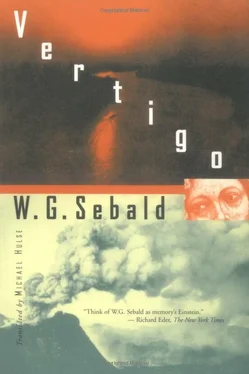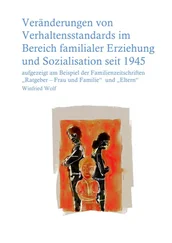Winfried Sebald - Vertigo
Здесь есть возможность читать онлайн «Winfried Sebald - Vertigo» весь текст электронной книги совершенно бесплатно (целиком полную версию без сокращений). В некоторых случаях можно слушать аудио, скачать через торрент в формате fb2 и присутствует краткое содержание. Год выпуска: 2001, ISBN: 2001, Издательство: New Directions, Жанр: Современная проза, на английском языке. Описание произведения, (предисловие) а так же отзывы посетителей доступны на портале библиотеки ЛибКат.
- Название:Vertigo
- Автор:
- Издательство:New Directions
- Жанр:
- Год:2001
- ISBN:978-0811214858
- Рейтинг книги:4 / 5. Голосов: 1
-
Избранное:Добавить в избранное
- Отзывы:
-
Ваша оценка:
- 80
- 1
- 2
- 3
- 4
- 5
Vertigo: краткое содержание, описание и аннотация
Предлагаем к чтению аннотацию, описание, краткое содержание или предисловие (зависит от того, что написал сам автор книги «Vertigo»). Если вы не нашли необходимую информацию о книге — напишите в комментариях, мы постараемся отыскать её.
Vertigo
The Emigrants
The Rings of Saturn
The New York Times Book Review
The Emigrants
Vertigo — читать онлайн бесплатно полную книгу (весь текст) целиком
Ниже представлен текст книги, разбитый по страницам. Система сохранения места последней прочитанной страницы, позволяет с удобством читать онлайн бесплатно книгу «Vertigo», без необходимости каждый раз заново искать на чём Вы остановились. Поставьте закладку, и сможете в любой момент перейти на страницу, на которой закончили чтение.
Интервал:
Закладка:
I made my way back from the National Gallery to Liverpool Street station on foot. As I did not want to walk along the Strand and then down Fleet Street, I negotiated the labyrinth of smaller streets above these busy thoroughfares; Chandos Place, Maiden Lane and Tavistock Street took me to Lincoln's Inn Fields and from there, via Holborn Circus and the Holborn Viaduct, I reached the western perimeter of the City. I cannot have covered much more than three miles, yet I felt as if I had never walked so far in my life than on that afternoon. I became fully aware of my fatigue, however, only as I paused at the threshold of an underground station, from which came the familiar sweetish, dusty warmth of the subterranean world, and, as I stood there, detected, like a scent which might stir the imaginings of an oarsman far out to sea, the faint perfume of the white, pink and russet-red chrysanthemums being sold at the entrance by a man with something of Prospero about him. I then realised that this was the station where, on my frequent journeys by tube, no one ever embarked or alighted. The train would stop, the doors open; one looked out onto the deserted platform and heard the warning "Mind the gap"; the doors would close again, and the train move off. Whenever I had travelled through that station it had been the same, and on not one occasion did any of the other passengers so much as raise an eyebrow. Evidently it was only I who found this strange circumstance unnerving. So now I stood on the pavement before the entrance to that very station and, if I were not to walk that last tiring stretch, I had only to enter the dark ticket hall where, apart from a black woman sitting in her inspector's box, there was no sign of life. Although I stood there for a considerable time, on the very brink so to speak, and even exchanged a few glances with the black inspector, I did not dare to take the final step.
The train rolled slowly out of Liverpool Street station, past the soot-stained brick walls the recesses of which have always seemed to me like parts of a vast system of catacombs that comes to the surface there. In the course of time a multitude of buddleias, which thrive in the most inauspicious conditions, had taken root in the gaps and cracks of the nineteenth-century brickwork. The last time I went past those black walls, on my way to Italy in the summer, the sparse shrubs were just flowering. And I could hardly believe my eyes, as the train was waiting at a signal, to see a yellow brimstone butterfly flitting about from one purple flower to the other, first at the top, then at the bottom, now on the left, constantly moving. But that was many months ago, and this butterfly memory was perhaps prompted only by a wishful thought. There was no room for doubt, however, about the reality of my poor fellow travellers, who had all set off early that morning neatly turned out and spruced up, but were now slumped in their seats like a defeated army and, before they turned to their newspapers, were staring out at the desolate forecourts of the metropolis with fixed unseeing eyes. Soon, where the wilderness of buildings thinned out a little, three tall blocks of flats entirely boxed in scaffolding and surrounded by uneven patches of grass became visible at some distance, while much further off, before the blazing strip of sky on the western horizon, rain fell like a great funeral pall from the dark-blue cloud that hung over the entire city. When the train changed track, I was able to glance back at the great towers of the City, rising far above everything around them, the topmost storeys gilded by the rays of the sun slanting in from the west. The suburbs swept past — Arden, Forest Gate, Maryland — before we reached the open countryside. The light over the western horizon was gradually extinguished. The shadows of evening were already settling on the fields and hedgerows. Idly I turned the pages of an India paper edition of Samuel Pepys's diary, Everyman's Library 1913, which I had purchased that afternoon, and read passages at random in this 1,500-page account, until drowsiness overcame me and I found myself going over the same few lines again and again without any notion what they meant. And then I dreamed that I was walking through a mountainous terrain. A white roadway of finely crushed stone stretched far ahead and in endless hairpins went on and up through the woods and finally, at the top of the pass, led through a deep cutting across to the other side of the high range, which I recognised in my dream as the Aips. Everything I saw from up there was of the same chalky colour, a bright, glaring grey in which a myriad of quartz fragments glimmered, as if the rocks, by a force deep inside them, were being dissolved into radiant light. From my vantage-point the road continued downward, and in the distance a second range of mountains at least as lofty as the first one arose, which I feared I would not be able to cross. To my left there was a drop into truly vertiginous depths. I walked to the edge of the road, and knew that I had never gazed down into such chasms before. Not a tree was there to be seen, not a bush, not even a stunted shrub or a tussock of grass: there was nothing but ice-grey shale. The shadows of the clouds scudded across the steep slopes and through the ravines. The silence was absolute, for even the last traces of plant life, the last rustling leaf or strip of bark, were long gone, and only "the stones lay unmoved upon on the ground. Into that breathless void, then, words returned to me as an echo that had almost faded away — fragments from the account of the Great Fire of London as recorded by Samuel Pepys. We saw the fire grow. It was not bright, it was a gruesome, evil, bloody flame, sweeping, before the wind, through all the City. Pigeons lay destroyed upon the pavements, in hundreds, their feathers singed and burned. A crowd of looters roams through Lincoln's Inn. The churches, houses, the woodwork and the building stones, ablaze at once. The churchyard yews ignited, each one a lighted torch, a shower of sparks now tumbling to the ground. And Bishop Braybrooke's grave is opened up, his body disinterred. Is this the end of time? A muffled, fearful, thudding sound, moving, like waves, throughout the air. The powder house exploded. We flee onto the water. The glare around us everywhere, and yonder, before the darkened skies, in one great arc the jagged wall of fire. And, the day after, a silent rain of ashes, westward, as far as Windsor Park.
Интервал:
Закладка:
Похожие книги на «Vertigo»
Представляем Вашему вниманию похожие книги на «Vertigo» списком для выбора. Мы отобрали схожую по названию и смыслу литературу в надежде предоставить читателям больше вариантов отыскать новые, интересные, ещё непрочитанные произведения.
Обсуждение, отзывы о книге «Vertigo» и просто собственные мнения читателей. Оставьте ваши комментарии, напишите, что Вы думаете о произведении, его смысле или главных героях. Укажите что конкретно понравилось, а что нет, и почему Вы так считаете.












